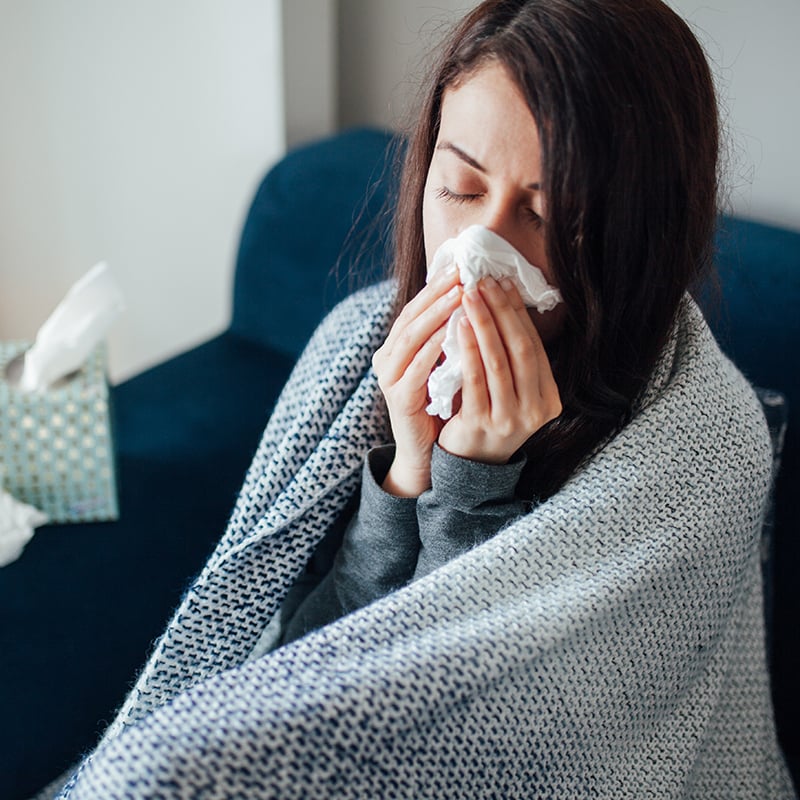How To Protect Yourself During Flu Season
Want To Ward Off Illness? Vaccines, Common Sense Are The Best Defense.

It’s been warm, it’s been cool—and there’s also been a cloud of smoke in the air. The weather this past week has wreaked havoc on many of us, to the point where it’s giving us colds, coughs and chills. This, of course, is just the start of things.
Flu season is underway, and it reaches its peak between December and February. In New Jersey, doctor’s offices are already experiencing increased patient visits for flu-like illnesses, according to the state Department of Health’s most recent Respiratory Illness Surveillance Report (RISR). The same report indicates a rise in the number of positive cases of respiratory syncytial virus (RSV).
Your health forecast for the next few months, however, doesn’t have to be filled with runny noses, fevers and aches and pains. If you haven’t done so already, now is the perfect time to get updated vaccines that protect against respiratory viruses such as the flu, RSV and COVID-19.
“These vaccines are updated to give you the best protection from serious illness, hospitalization and death,” says New Jersey Department of Health Commissioner Kaitlan Baston, M.D. “We recommend that everyone eligible receives the latest vaccines, especially those at higher risk for severe illness.”
Fight the Flu
The flu—marked by symptoms including fever, aches, fatigue and cough, among others—impacts one out of every five Americans each year, according to the National Institutes of Health. To curb the spread of the virus, the Centers for Disease Control and Prevention (CDC) recommends the flu vaccine for everyone age 6 months and older, except when a patient is allergic. It’s best to get the vaccination as early in the season as possible, as antibodies that fight the virus develop roughly two weeks after the shot is administered.
Beyond the vaccine, there are steps you can take to avoid and prevent the spread of the flu virus. “Use hand sanitizer, wash hands thoroughly, cover your nose and mouth when you cough and sneeze,” says Sonia Chadha, M.D., a Paramus-based primary care physician. “You’ll greatly reduce your risk of getting sick.”
Protect Against RSV
RSV is another common respiratory illness this time of year, and it can lead to cold-like symptoms such as congestion, coughing, sneezing, wheezing and fever. In serious cases, the virus can cause pneumonia or bronchiolitis, particularly in young children and older adults. For prevention, the CDC recommends a single-dose RSV vaccine for everyone age 75 and older and for adults ages 60 through 74 who have chronic heart or lung disease, weakened immune system or other chronic medical condition. Two different immunizations are also recommended to protect infants from severe RSV—one that’s given to the mother during pregnancy, and another that’s administered to infants after birth.
Most people will recover from RSV in one to two weeks with rest and medication (either over the counter or prescription). Because the virus is easily spread through an infected person’s cough or sneeze, everyone should observe safe hygiene practices, Dr. Chadha says. The practices include washing your hands often with soap and hot water for at least 20 seconds and cleaning frequently touched surfaces like doorknobs and smartphones.
“And remember to be respectful for others,” she says. “Stay home if you have any symptoms like coughing, sneezing, fever, chills and/or body aches. Staying safe and healthy is a team effort.”
Update Your COVID Vaccine
Though the isolation of the pandemic is long over, COVID-19 is here to stay. That means we’re still susceptible to symptoms like fever, cough, congestion and loss of smell and taste. The good news is reported cases in New Jersey are low, and there’s been a decrease in COVID-related emergency department visits, according to the NJ health department’s RISR. The CDC, however, last month updated its vaccine recommendations: The agency says everyone ages 6 months and older should get the 2024-25 vaccine, especially those who are 65+, are at high risk for severe COVID or have never received a COVID vaccine.
The CDC states: “Vaccine protection decreases over time, so it is important to stay up to date with your COVID-19 vaccine.” The updated vaccines also are better adapted to protect against newer virus strains.
Contact your primary care physician if your symptoms worsen over time and if you have questions about vaccinations.
For the latest health updates, read Health News in our November issue now.

